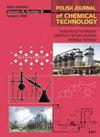通过反式酯化反应合成乙酸香茅酯的酶法合成及其影响参数
IF 1
4区 工程技术
Q4 CHEMISTRY, APPLIED
引用次数: 0
摘要
乙酸香茅酯是食品、化妆品和医药领域香精香料的重要成分。在非水介质中,可以通过脂肪酶催化成功生产这种物质。本研究的重点是在非水介质中,通过脂肪酶催化香茅醇与乙酸香叶酯的反酯化反应,生成乙酸香茅酯。为了合成乙酸香茅酯,研究人员对从黑小茴香、葫芦巴、芫荽、亚麻和油菜籽等几种植物幼苗中分离出来的丙酮粗粉进行了脂肪酶活性检测。在 72 小时的反应时间内,黑小茴香幼苗脂肪酶的乙酸香茅酯产量最高,达到 76.32%。为了评估不同反应参数对有机溶剂中乙酸香茅酯生产的影响,选择正己烷作为最佳溶剂,并选择黑小茴香幼苗脂肪酶作为最佳生物催化剂。当 0.25 M 乙酸香叶醇和 0.25 M 香茅醇在 41 oC 温度下反应 72 小时后,在 0.25 克幼苗脂肪酶在正己烷中存在的情况下,酯的转化率最高(76.32%)。研究结果表明,粗制黑小茴香幼苗脂肪酶价格低廉但效果显著,具有在工业上用于合成萜烯酯的潜力。本文章由计算机程序翻译,如有差异,请以英文原文为准。
Enzymatic synthesis and parameters affecting on citronellyl acetate ester by trans-esterification reaction
Citronellyl acetate is a crucial component of flavor and fragrance in the food, cosmetic, and pharmaceutical sectors. In non-aqueous media, it can be successfully produced via lipase catalysis. This study focuses on the lipase-catalyzed trans-esterification of citronellol alcohol with geranyl acetate ester in a non-aqueous medium to produce citronellyl acetate. For the synthesis of citronellyl acetate, crude acetone powders isolated from several plant seedlings of black cumin, fenugreek, coriander, flax, and rape seed were examined for lipase activity. Black cumin seedling lipase had the highest level of citronella acetate production with a yield of 76.32% in 72 h of reaction time. To assess the impact of different reaction parameters on citronellyl acetate production in organic solvents, hexane was chosen as the best solvent, and black cumin seedling lipase was selected as the best biocatalyst. The highest conversion yield of ester (76.32%) was found when 0.25 M of geraniol acetate and 0.25 M of citronellol reacted at 41 o C after 72 h in the presence of 0.25 g of seedling lipase enzyme in n-hexane. It has been determined that crude black cumin seedling lipase is inexpensive yet effective and has the potential to be used industrially for the synthesis of terpene esters.
求助全文
通过发布文献求助,成功后即可免费获取论文全文。
去求助
来源期刊

Polish Journal of Chemical Technology
CHEMISTRY, APPLIED-ENGINEERING, CHEMICAL
CiteScore
1.70
自引率
10.00%
发文量
22
审稿时长
4.5 months
期刊介绍:
Polish Journal of Chemical Technology is a peer-reviewed, international journal devoted to fundamental and applied chemistry, as well as chemical engineering and biotechnology research. It has a very broad scope but favors interdisciplinary research that bring chemical technology together with other disciplines. All authors receive very fast and comprehensive peer-review. Additionally, every published article is promoted to researchers working in the same field.
 求助内容:
求助内容: 应助结果提醒方式:
应助结果提醒方式:


